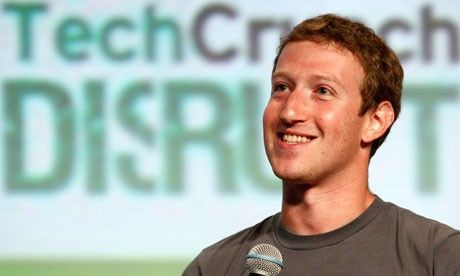Technology Focus: Zuck's Good Week Without Changing Name

Facebook (Nasdaq: FB), the No. 1 social networking site, had a good week: its shares vaulted 15 percent after CEO Mark Zuckerberg appeared at a forum in San Francisco where he acknowledged mistakes, made himself as sympatico as Bill Clinton about feeling investors' pain and then promised to do better.
Facebook shares closed at $22, valuing the Menlo Park, Calif., company at $47.1 billion, less than half its value before initial public offering trading started on May 18. The surge brought the 28-year-old founder's share above $11 billion, notwithstanding the $4.8 billion he raised in the IPO.
Zuckerberg, who was interviewed by a sympathetic member of the TechCrunch unit of AOL (NYSE: AOL), didn't promise Facebook, with its 955 million members, would turn profitable or finally determine what happened during the 30-minute gap when the shares started trading on Nasdaq on May 18.
Rather, he essentially bet the company on two overriding themes: mobility and search. Maybe he should have announced he was changing the name to Facebook Mobile or Facebook Google or announced a major deal with Yahoo (Nasdaq: YHOO), the No. 3 search engine, with which Facebook recently settled a lawsuit.
One reason is that even before the IPO, analysts at some of Facebook's IPO underwriters warned growth was slowing for the eight-year-old company founded three years before Apple (Nasdaq: AAPL), the world's most valuable technology company, invented the iPhone.
To react, Zuckerberg agreed to buy Instagram, the San Francisco photo apps sharing specialist, for $1 billion in cash and shares. By the time the deal closed last month, the purchase was only around $735 million, due to the Facebook share collapse.
Judge us by how well we do with mobile, Zuckerberg said. He added that he wrote his letter to shareholders for the Feb. 1 IPO documents on his smartphone. Mobile users are a lot more likely to be engaged than desktop users, he said.
To be sure, Google (Nasdaq: GOOG), the No. 1 search engine spent $12.5 billion to acquire Motorola Mobility to get directly into the smartphone sector directly, hoping for more searches for Google Chrome, Zagat Guides and all its other services. Then it built up its rival Google+, which now claims more than 250 million registered users.
Zuckerberg lauded search. Facebook is already handling a billion queries a day, he said, and the system is not even trying. Over time, that needs to ramp up more and also provide better answers. Zuckerberg said a user ought to be able to ask a smartphone to identify sushi restaurants in New York friends of mine have gone to.
Maybe some of the 650 patents Facebook acquired in May from Microsoft (Nasdaq: MSFT), the world's biggest software company and a Facebook investor, will help, as will rights to another 340 patents still owned by the Redmond, Wash., company. Microsoft for years has been handling the larger part of Yahoo's mechanics, anyway.
So now, Facebook is not just a somewhat anemic desktop platform for consumers and some enterprises but an info utility for the iPhone 5 era. Can't hurt much, especially when analysts are predicting third-quarter net income of only $288.6 million, or 6 cents a share, on revenue of $1.23 billion, compared with $954 million a year earlier.
Of 37 analysts who follow the company, nearly half are neutral, while 21 now rate it buy at current levels, or essentially half the price of the IPO.
Even at the current level, Facebook's price-earnings ratio is a staggering 122 (vs. 16 for Apple or 15 for International Business Machines Corp. (NYSE: IBM)). The company still has only a single woman director, Sheryl Sandberg, who's also its top woman executive. And director Peter Thiel didn't do shareholders much good by liquidating most of his remaining shares last month.
Is Facebook worth a second look? Probably not, but at half price, as well as $10 billion in the bank and some promising new partnerships, maybe it can start writing a new chapter.
© Copyright IBTimes 2025. All rights reserved.






















